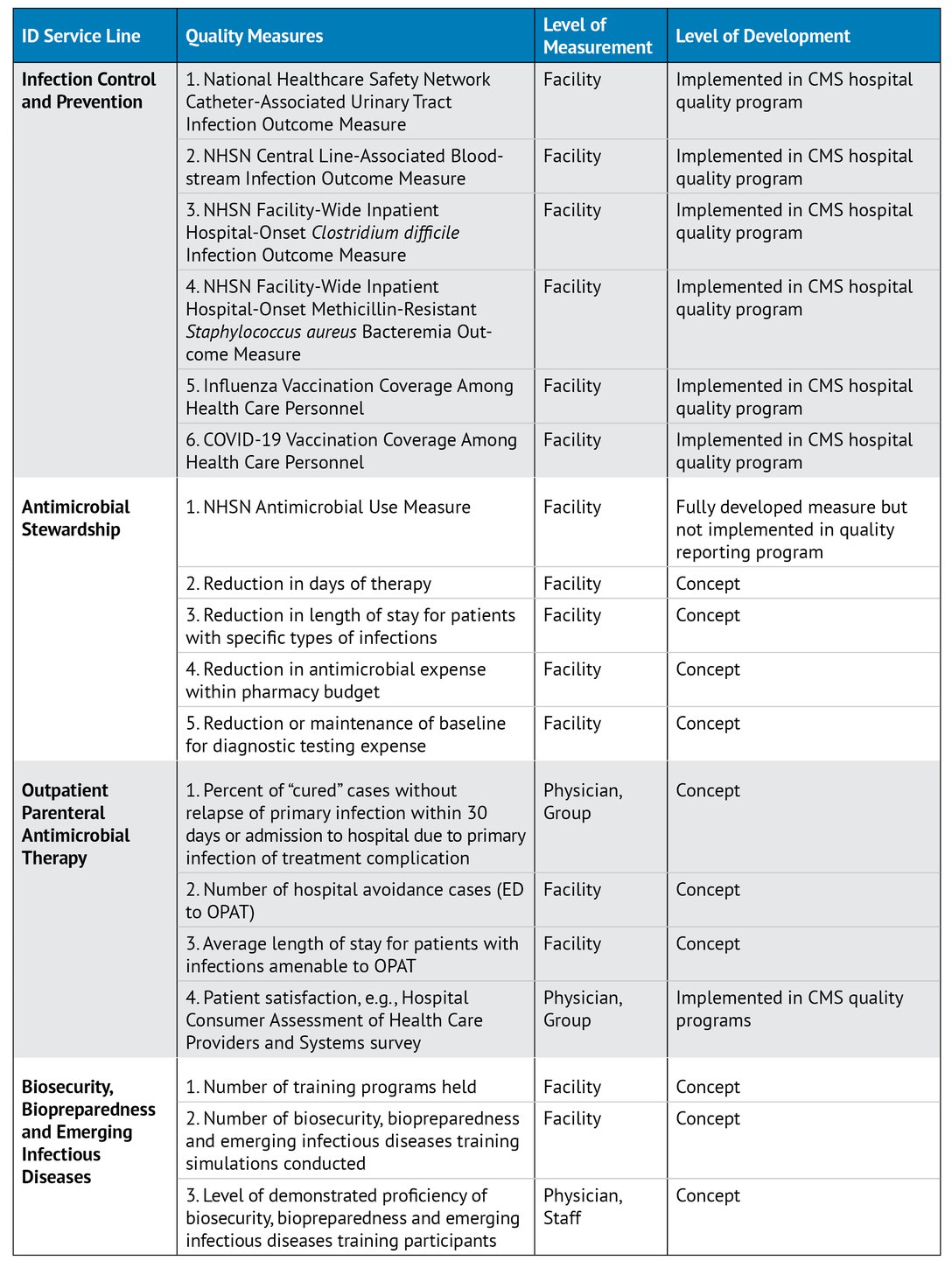Previous Page
${prev-page}
Next Page
${next-page}


Please Tell Us What You Think

Thank you for your interest in the Value-Based Arrangements Guide. Please complete this short survey to let us know what you think. Your feedback is instrumental in helping to shape future versions of this and other educational resources being developed as part of IDSA’s Physician Compensation Initiative.
The survey should take only 5 minutes to complete.
Open Survey
Negotiation Process
Negotiation Process
G. ID Service Line Applications
These considerations include the services being offered by an ID physician or practice. The list of potential services is long and variable depending on the market but can range from comprehensive ID services (e.g., a physician or practice that is responsible for all ID-related activities, clinical and administrative) to a single ID service (e.g., infection control, antimicrobial stewardship, COVID‑19/special pathogens medical direction). Considering the predominate service lines that ID physicians support at their organizations, the following service lines emerge as opportunities for ID value-based care arrangements:
• Infection Control and Prevention;
• Antimicrobial Stewardship;
• Outpatient Parenteral Antimicrobial Therapy;
• Biosecurity, Biopreparedness and Emerging Infectious Diseases.
The IDSA Quality Improvement Committee also sought to identify the extent and types of measures currently available for use by ID clinicians, for accountability program reporting and/or quality improvement purposes. For each measure identified, we wished to identify who stewards those measures, and in which programs they are used. In conducting the search, we focused on measures related to the diagnosis and treatment of infectious diseases. The list of ID quality measures that can be used in VBC arrangements if applicable to a specific physician or practice type situation after consideration is given to the items in this section.
For the four service lines mentioned in the ID Service Line Considerations, table 2, Quality Measures for ID Service Lines, includes proposed metrics that may be considered for one’s VBC arrangement. The measures included are measures that have been implemented in quality programs, measures that have been implemented in medical specialty societies’ qualified clinical data registries or measures that are conceptual and require additional work to use in VBC arrangements. Table 2 is intended to help provide a quality measures starting point for ID physicians to then create tailored VBC arrangements within the ID service lines.
TABLE 2: Quality Measures for ID Service Lines

H. Importance of Data
To be successful in any type of VBC arrangement, one must have timely access to data and analytical support to calculate scores for quality measures. In working with the decision-makers in creating a VBC arrangement, asking for and securing organizational information technology support is critical. ID physicians should negotiate for terms that provide them with the best feedback loop available for data outputs that are easily understood and implementable in the clinical setting. The feedback loop may consist of dashboards or quality measure reports provided weekly, twice-weekly or other routine time intervals.
I. Barriers to Adoption and Implementation
When transitioning and implementing value-based arrangements and at-risk behavior, there are often challenges to factor in and consider. Historically, compensation has been highly aligned with productivity and reimbursement, making the shift to nonproductivity performance foreign and challenging to adopt. Key factors to consider when implementing value as a component in compensation include:
• Disconnect between work relative value units and care coordination;
• Patient care effectiveness through coordinated care teams;
• Incompatibility with reward mechanisms across the patient continuum;
• Communicating the shift from wRVUs and reimbursement mechanisms to be the ancillary driver rather than primary lever of compensation;
• Misaligned incentives and a lack of transparency in the achievement of value-based goals.
J. Impact on and Collaboration With Other Specialties
An ID physician will need to be aware of the potential value-based contracts that are active within other specialties and consider ways to mitigate direct competition with these specialties for funding. At the hospital system operational level, opportunities exist for ID providers to partner with other specialties to manage population-level protocols. A few examples include:
• Partnering with orthopedics to prevent and treat prosthetic joint infections;
• Partnering with general surgery or obstetrics and gynecology to decrease COLO SSI and HYST SSI;
• Partnering with transplant surgeons to prevent and treat infections after transplant.
K. Best Practices
When negotiating for the recognition of high performance in a value-based arrangement, physicians should be armed with clearly defined measures as well as evidence that these measures make a meaningful impact on institutional performance within the value-based arrangement. Compensatory negotiations have been more successful when an economic value can be discerned from the actions taken by the physician.
• Consider an incentive model that allows for team-based sharing and potential comanagement-like goals (i.e., reduction in readmission rates due to HAI, HAI mitigation and protocol strategies, and population-level infection planning).
• Consider negotiating for managing outbreak responses (e.g., COVID‑19), which would include early identification and control of an outbreak within a hospital and would be considered a separate agreement rather than a longitudinal agreement for preparation activities. This requires a fair amount of effort. Importantly, physicians on a production-based compensation plan (e.g., compensation per wRVU, revenue less expense, percentage of professional collections) may not be fairly compensated during an outbreak or pandemic if services being rendered generate less revenue than traditional ID clinical services.